Legislation for Anti-Corruption Evaluation
The agency carries out ANTI-CORRUPTION EVALUATION OF LEGAL ACTS, which means reviewing the form and substance of legal acts drafted or approved in order to detect and minimize the risks of corruption in the legislation;
The Agency develops the Methodology for anti-corruption evaluation of legal acts which aims to help the Agency achieve its goals in preventing corruption in legislation in a more effective and efficient way, by providing a structured approach to identifying and avoiding such risks. At the same time, the Methodology aims to ensure that the draft normative act and/or legislation in force is in accordance with international anti-corruption standards.
The evaluation of draft normative acts can be done at the request of the proposing body, or on the Agency’s own initiative, according to a predetermined priority.
The evaluation of the potential risks of corruption in the legislation is also done to ensure their compliance with international anti-corruption standards.
SECTORAL CORRUPTION RISK ASSESSMENT is the process of identifying institutional risks that can facilitate corruption, and the recommendations for mitigation measures;
For this purpose, the Agency develops the methodology which provides a systematic approach and set of techniques that are used to identify, analyse and assess the possibility and potential impact of corruption risks within a given organization, sector or context.
The methodology includes a structured examination of various factors, gaps and indicators that may contribute to corrupt practices and legal violations, in order to understand the risks and plan for preventive measures.



